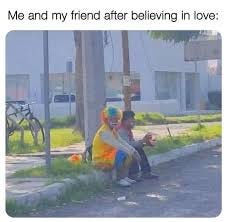You go on a date. It’s fine. Fine in the way that’s hard to write off but harder to feel excited about. They’re warm. Interested. They ask a few questions. You leave the coffee shop and think, “well, maybe.” Then the spiral starts.
You remember that interest feels like danger to people with avoidant attachment. You remember that boredom can actually be a sign of nervous system dysregulation. You remember that your ex was extremely charming and turned out to be a malignant narcissist, and you liked him a lot, so clearly your instincts aren’t to be trusted. You sit in your clown car wondering if your lack of enthusiasm is intuition or trauma, if you’re calm or numb, if your gut is trying to tell you something real or just replaying old cassette tapes from 1996.
There was a time when this kind of confusion would’ve been resolved with a quick thanks-but-no-thanks phone call and a vague excuse. But now we have vocabulary. Now we have TikTok accounts with licensed therapists telling us to “lean into secure attachment even when it feels boring,” and Instagram reels warning that the people we like are probably trying to trap us inside a dysregulated dynamic rooted in childhood wound repetition. It’s not so much that dating has gotten harder (which, ok it has), it’s that being a single person now seems to require a minor degree in psychodynamic theory.
Somewhere along the way, everyone became a diagnostician. Date didn’t text back for two days? Avoidant. Date brought up an ex? Emotionally unavailable. Don’t want to see someone again, despite their kindness and emotional fluency? That’s a “me” problem. Fear of intimacy rearing its head like a hydra. Kill one doubt and nine more appear.
I’m wary of people who like me right away. Not because I think they’re wrong to necessarily (though also kind of that), but because I assume they’ve misread something. Their enthusiasm feels like a category error. But I’ve also met a few who were immediately enamored, who I liked back. So either I’m inconsistent, or human, or too distrustful of anything that doesn’t require a minor existential crisis to feel real. All of which raises the irritating question: why can’t I just trust myself?
Somehow I retracted my own permission to just notice. I run every reaction through an internal audit. Do I dislike this person because they’re too available, or do I dislike them because they said “yummy” at dinner last night? Am I interpreting my feelings clearly, or is my autonomic nervous system stuck in a freeze response because my dad forgot to pick me up from preschool one time?
The result is a kind of perpetual epistemological standoff. I feel nothing and wonder if that’s fear. I feel everything and assume it’s a trauma reenactment. I like someone and worry it’s because they remind me of the worst person I’ve ever dated. I dislike someone and worry it’s because they are too available.
The line used to be to “trust your gut,” but now the gut is just another unreliable narrator (have you tried probiotics?), a cranky old clown yelling at passing cars. Sometimes the clown is right, sometimes he just needs a turkey sandwich.
I worry I’ve therapized myself out of the ability to make good decisions. I can name every pattern but can’t tell you whether I actually want a second date. I can recognize every maladaptive loop but still end up going on three walks with a married guy whose wife beats him up. It’s a strange modern ailment: fully developed, overlapping narratives about my own dysfunction paired with total confusion about what to do next. Usually, I call five friends and ask them. They all disagree.
I’m trying to break these cycles. I don’t want to waste years in a relationship that mimics my marriage, or a situationship that triggers my trauma. I don’t want to settle. But at some point, constantly diagnosing myself becomes its own form of avoidance. If I spend enough time parsing my resistance, I never actually have to risk wanting anything. If I question every instinct, I don’t have to stand behind any of them.
What I’ve come to believe is that maybe the goal isn’t to perfectly interpret every signal. Maybe it’s just to notice what keeps happening, and try to want slightly better things next time. To accept that some of my instincts are untrustworthy, but not all of them. To allow for the possibility that I didn’t want to kiss him not because I’m afraid of love but because I’m just actually not that interested.
Desire isn’t a lab report. Sometimes it’s a shrug. Sometimes that shrug is the answer.
And occasionally, I go on a date and nothing misfires. There’s no panic, no dissection, no immediate need to consult the DSM-5 or my inner archive of misread signals. Sometimes I feel something that doesn’t demand analysis. Something simple.
I want more of that.








